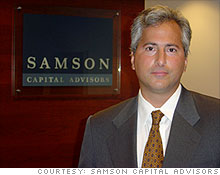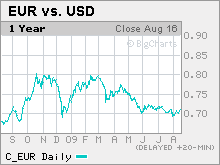Diversifying with currencies
Jonathan Lewis of Samson Capital Advisors shares his thoughts on why and how much you should add to your portfolio.
 |
| Jonathan Lewis: "Currency investments are not correlated with stocks and bonds, so they help with diversification." |

| MMA | 0.69% |
| $10K MMA | 0.42% |
| 6 month CD | 0.94% |
| 1 yr CD | 1.49% |
| 5 yr CD | 1.93% |
NEW YORK (Fortune) -- The financial crisis has wreaked havoc on many a money manager, but not Samson Capital Advisors, a firm that offers bond and currency investments to endowments and high-net worth individuals and families.
Samson's assets under management have jumped to $6 billion from $3.5 billion at the beginning of 2008, as more investors were drawn to its focus on tax efficiency, wealth preservation, and inflation protection.
Samson is perhaps best known for its conservative domestic bond strategies, but its currency investment plan -- which is called the Multicurrency Plus Strategy -- has also been popular with investors. It was designed to be a piece of a broader investing strategy that protects portfolios from losing value if the dollar weakens.
Multicurrency Plus was up, 4.8% after fees in the first half of this year, while the inverse of the U.S. Dollar Index was up 1.5%; it has returned nearly 22% since its inception in 2004, vs. 12.3% for the U.S. Dollar Index.
Jonathan Lewis, a founding partner and portfolio manager at Samson, recently spoke with Fortune about why investors should include currencies in their portfolios to be truly diversified, and how much they should allocate to this asset class.
Currency rarely gets a mention in conversations about diversification. Why do your clients use it?
Everybody has a view on the dollar, but very few people make investment moves based on their views. There is a striking disconnect. Among the world's major currencies there are significant movements for and against the dollar that create opportunities to add value, and they are largely ignored.
There are lots of ways to invest in currencies, including high-frequency trading strategies and currency hedges. Our strategy is for long-term investors. We invest directly in a basket of currencies and adjust our weighting only a few times in a quarter.
Because we don't hedge, we avoid getting whipsawed in an environment where there is no clear trend, like now. Our clients want a long-term vehicle that protects their wealth should the value of the dollar erode, and they are prepared for short term fluctuations.
Why not just buy foreign stocks or bonds to hedge against a downturn in the U.S.?
Currency investments are not correlated with stocks and bonds, so they help with diversification. While stocks around the world suffered significant losses, currency investments held their value better. And we saw that when the U.S. economy showed serious problems, stocks all over the world fell.
When you buy foreign bonds an opinion about the health of that place is expressed; and that is similar to what it means to invest in currencies. But bonds have interest rate risk.
Neither stocks nor bonds are direct expression of one's view on the dollar and neither protect the purchasing power of your portfolio should the dollar decline in value.
What is your outlook for the dollar?
Given the state of the economy, the possible effects of financial stimulus, and the current state of interest rates, we believe the long-term trend is bearish: If that's the case, commodities and gold could rally while stock performance might suffer.
How do you explain the recent dollar rallies?
Whenever there are bumps in the road, as there have been recently, people buy Treasuries. Treasuries are denominated in dollars, so the desire to find a safe haven supports the dollar and challenges non-dollar strategies.
But over the long term, the picture is less certain. One thing that determines currency trading is central bank strategies. Currencies generally rally more in countries that are tough on inflation than those that are very lax.
Right now our Federal Reserve chairman Ben Bernanke has said that interest rates will be low for a long time, so don't expect the dollar to outperform. And other countries are trying to figure out how to be less dependent on the dollar.
Are you speaking specifically about China?
China will play a big role in the fate of the dollar. The head of its central bank, Zhou Xiaochuan, made stark statements this July about the failure of the U.S. financial system. This is not what he wants to see in the world's reserve currency.
Some of that statement was economic analysis and some was political rhetoric, but people do act out of their best interests. Right now it's in everyone's best interest to stabilize the U.S. financial system and to sell dollars would only exacerbate problems here. But China's goal is clearly to diversify away from the dollar at some point in the future.
How much of a portfolio should be allocated to currencies?
It depends on the investor's individual view on the dollar. In the absence of a fundamental view, about 5% makes sense for a conservative person looking for diversification. If you believe the dollar will decline your portfolio allocation would be more; and if you think it will rally, your allocation would be less.
What does your currency portfolio look like now?
We hold a basket of currencies and shift our weighting to reflect the current market. Coming into this year and for most of this year, we had large allocations to the Canadian dollar and the Australian dollar because we believed that central bank easing and stimulus would stabilize the world economy and lead to reflationary concerns. Commodities exporting countries like Canada and Australia benefit in that environment. We were underweight the Yen and the Swiss Franc, which are safe haven currencies.
Now that it seems that the recovery may not be as strong as some had hoped, we've reduced our growth tilt and increased our exposure to safe haven currencies. ![]()
Betting on casino stocks
Adventurous mutual funds for uncertain times
A bear who sees no bulls down the road
-
 The retail giant tops the Fortune 500 for the second year in a row. Who else made the list? More
The retail giant tops the Fortune 500 for the second year in a row. Who else made the list? More -
 This group of companies is all about social networking to connect with their customers. More
This group of companies is all about social networking to connect with their customers. More -
 The fight over the cholesterol medication is keeping a generic version from hitting the market. More
The fight over the cholesterol medication is keeping a generic version from hitting the market. More -
 Bin Laden may be dead, but the terrorist group he led doesn't need his money. More
Bin Laden may be dead, but the terrorist group he led doesn't need his money. More -
 U.S. real estate might be a mess, but in other parts of the world, home prices are jumping. More
U.S. real estate might be a mess, but in other parts of the world, home prices are jumping. More -
 Libya's output is a fraction of global production, but it's crucial to the nation's economy. More
Libya's output is a fraction of global production, but it's crucial to the nation's economy. More -
 Once rates start to rise, things could get ugly fast for our neighbors to the north. More
Once rates start to rise, things could get ugly fast for our neighbors to the north. More







